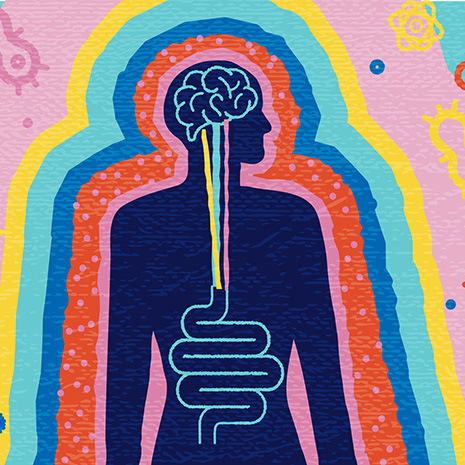Research Focus
The Weaver-Toedtman Lab investigates biopsychosocial influences on the brain-gut connection in individuals with chronic abdominal pain and other chronic conditions. We are interested in how the intersection of these factors influence health outcomes and incorporate omics and other discovery methodologies in these research endeavors.
Current Research Study
Chronic stress and biological aging among individuals with IBS
Enrollment closed

The long-term objective of this research is to attenuate pain, stress, and accelerated aging among individuals with irritable bowel syndrome (IBS), with a particular focus on sexual and gender minority (SGM) groups. The specific goals of this research study are as follows:
- Assess feasibility and acceptability of virtual study visits with psychosocial assessments among individuals with and without IBS.
- Assess feasibility and acceptability of remote biospecimen collection for telomere length and steroid hormone quantification among individuals with and without IBS.
- Examine associations of health and stress-related factors with telomere length and steroid hormones among individuals with and without IBS.
Individuals who choose to participate will attend two virtual study visits via Zoom about three weeks apart, complete online questionnaires during study visits, two brief questionnaires per week in between visits, collect saliva (to measure telomere length, a marker of aging) and fingernail clippings (to measure chronic cortisol, a marker of stress) at home which are mailed back to USC (prepaid packaging). Individuals do not have to live in South Carolina to participate and are compensated $175 for their time and effort.
- Individuals aged 18-64 years of age with a diagnosis of irritable bowel syndrome (IBS) or another disorder of gut-brain interaction (DGBI) as confirmed by documentation from a healthcare provider, OR ability to serve as a Healthy Control.
- Ability to read/write in English.
- Access to smartphone/computer with internet and camera.
- Willingness to participate in study procedures (if participants cannot provide fingernail clippings due to acrylic nails, inability to grow nails, etc., inclusion will still be permitted).
- Any organic gastrointestinal (GI) condition (inflammatory bowel disease: Crohn's disease, Ulcerative Colitis, active H. pylori infection, etc.).
- Severe psychiatric condition requiring recent hospitalization.
Previous Studies
The purpose of this study was to assess the feasibility of evaluating women with and without chronic pelvic pain (CPP) from a biopsychosocial perspective. Specifically, the goals of this research study are:
- Assess feasibility and acceptability of remote, longitudinal biospecimen collection for ovarian hormone levels (estradiol and progesterone) via saliva, and the vaginal microbiome via self-collected vaginal swabs in women with and without chronic pelvic pain (CPP).
- Assess feasibility and acceptability of virtual study visits with psychosocial-based assessments in women with and without CPP.
- Evaluate the intersection of ovarian hormone levels (estradiol and progesterone) with the vaginal microbiome, and their associations with health-related factors and interpersonal relationships in women with and without CPP.
Individuals who chose to participate attended two online/virtual study visits over the course of approximately one month/menstrual cycle, complete online questionnaires, daily symptom assessment, and collect two saliva samples and two vaginal swabs at home which were mailed back to USC. Individuals did not have to live in South Carolina to participate, and were compensated $200 for their time and effort.
The long-term objective of this study is to better understand how sex- and/or gender-based factors contribute to the disproportionate burden of irritable bowel syndrome (IBS) in women. Specifically, the goals of this research study are twofold:
- Assess feasibility and acceptability of remote, longitudinal salivary steroid hormone measurement in women and men with irritable bowel syndrome (IBS) and women and men who serve as healthy controls (HC).
- Assess feasibility and acceptability of virtual study visits with psychosocial/gender-based assessments among women and men with irritable bowel syndrome (IBS) and women and men who serve as healthy controls (HC).
Individuals who chose to participate attended two online/virtual study visits over the course of approximately one month/menstrual cycle, completed online questionnaires, daily symptom assessment, and collected four saliva samples at home which were mailed back to the college. Individuals did not have to live in South Carolina to participate.
Inclusion Criteria
- Women and men (18-45 years of age)
- Ability to read/write in English
- Access to smartphone/computer with internet and camera
- Diagnosis of IBS and IBS subtype (for cases), with documentation provided by healthcare provider
- Willingness to participate in all study procedures
Exclusion Criteria
- Any organic gastrointestinal (GI) condition (inflammatory bowel disease: Crohn's disease, Ulcerative Colitis, active H. pylori infection, etc.)
- Any malignancies or endocrine disorders such as hypogonadism/ovarian hypofunction, polycystic ovarian syndrome, menstrual cycle irregularities, adrenal disorders
- Severe comorbid pain or psychiatric condition requiring recent hospitalization
- Pregnancy, recent pregnancy (past three months), or plans to become pregnant during study period
- Planned changes to GI medications during study timeframe
Meet the expert

